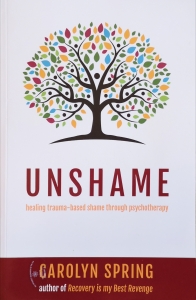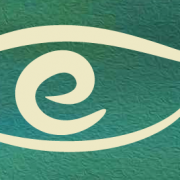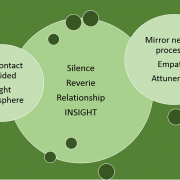Book Review: Unshame- healing trauma-based shame through psychotherapy by Carolyn Spring
Shame
Everyone has it
No-one wants to talk about it
But the less we talk about it
The more we have of it
Brene Brown
Overview
The author, Carolyn Spring, writes about her 9 years experience of psychotherapy. She focuses on her insights into her shame. Carolyn experienced extreme traumatic abuse during her childhood and has used her recovery and the knowledge she has acquired during and since this to support others. She tours with her training seminars supporting therapists, like myself and has researched, created and designed ‘psycho-educational tools’, books and on-line resources which help survivors of abuse.
In Unshame Carolyn neatly condenses years of therapy into discrete learning experiences, ranging from managing her dissociation to learning to trust present day experience.
Review
Carolyn’s clarity of thought comes through in her writing. As a therapist I have often struggled to fully understand how to help overcome shame. Having read Unshame I see that the functions of shame; to avoid connecting with others, avoid feeling worthy of help and keeping emotionally isolated are all quite disabling for any survivor, making recovery from shame very difficult to even contemplate let alone begin.
In her book Carolyn cleverly incorporates psychotherapeutic concepts, such as attachment, boundaries, pros and cons of physical contact, directive or non-directive work and what behavioural boundaries to apply. For the psychotherapist reader this can help consolidate or challenge their personal choice regarding working with clients suffering Dissociative Identity Disorder (DID). This may put some readers off, but I felt it really useful to hear how Carolyn experienced different counsellors and their approach to her dissociating. Carolyn writes of her journey understanding her DID; it being an all consuming experience, of which she would have no recall, to one that she is aware of and can take control. For Carolyn it feels invaluable that she had a counsellor be her witness to explore dissociation with her.
I expect for the reader, if a survivor of trauma, Carolyn’s ability and courage to describe her emotions, confusion, and apparent contrary thinking will help them to recognise this in themselves, perhaps providing hope and faith in their desire and ability to recover. The ability to move from black and white thinking; accepting the greyness and uncertainty of life can be hard for anyone.
Throughout Unshame I can see the importance for Carolyn to have permission to feel, act and think the way she did, at no time was her way of being ‘wrong’. The importance of recognising it as unhelpful ‘now’ but useful ‘then’ was a constant theme. It is also made clear that shame and symptoms of DID are not anything to do with her ‘not being right’ but a necessary and neurological consequence of trauma, fear and lack of attuned attachment.
Carolyn briefly refers to grounding techniques and the different zones of arousal, green (no arousal, able to be logical), amber (the nervous system getting aroused, emotional and less clarity of thought) to red (aroused, likely to dissociate, or freeze). These ideas are described in greater detail in her teaching videos and seminars.( Positive Outcomes for Dissociative Survivors/PODS )
Also in the book Carolyn covers forgiveness, self compassion and vulnerability. It is humbling being allowed to witness her thinking and movement towards these states.
Summary
This book is suitable for professionals and survivors of trauma; those with DID.
As a psychotherapist I benefited most from reading how Carolyn grappled with her thoughts, and the insights that arose. I did a lot of reflecting regarding the therapy I offer my clients, reaffirming that trusting process is both important for therapist and client. It is not a book which adds to knowledge that is already available, such as the work of Babette Rothschild in particular, but it does demonstrate it working in practice.
I cannot write from the clients or survivor’s perspective. I feel all peoples experiences will be different. One message to take home is as a survivor you have not done anything wrong. Nothing, absolutely nothing.
Resources
Unshame- healing trauma-based shame through psychotherapy By Carolyn Spring. Carolyn Spring Publishing (2019)
Positive Outcomes for Dissociative Survivors/PODS
The Body Remembers- The psycho-physiology of trauma and trauma treatment By Babette Rothschild. W.W Norton and Company LTD (2000)
The Body Remembers volume 2 -Revolutionising trauma treatment By Babette Rothschild. W.W Norton and Company LTD (2017)






 nick-fewings-ka7REB1AJl4-unsplash
nick-fewings-ka7REB1AJl4-unsplash